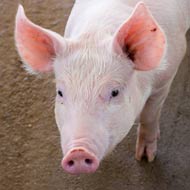Discovery could help fight classical swine fever

Classical swine fever was eradicated in the US in 1978 but still plagues pork producers in China and other countries.
New research could help China to fight classical swine fever, whilst preventing it spreading to other countries that are currently free from the disease.
This is according to a scientist from Kansas State University, who says he has developed a safe, inexpensive new vaccine. It uses a protein from the virus rather than live or attenuated virus - meaning the vaccine poses no biosecurity threat to the US.
The vaccine has been licensed to a Chinese animal health company so it can be tested in the field.
Classical swine fever was eradicated in the US in 1978 but still plagues pork producers in China and other countries. Each of the 700 million pigs raised annually in China receives two doses of the existing vaccine.
Professor Jishu Shi also discovered specific antibodies that can be used to differentiate between infected and vaccinated pigs. Animals given the current modified live virus vaccine test positive for classical swine fever. Prof Shi is working with colleagues at the US Department of Agriculture and in Europe and China to conduct further trials.
“This exciting discovery could result in solving an economic and trade problem in China - vaccines are expensive, and countries with classical swine fever can’t export pork - and a security problem for the US,” he explained.
Kansas State University’s vice president for research, Peter Dorhout, said: “Shi's work shows how we are expanding our reach around the world to build relationships, provide expertise and keep our food industries and supplies safe.”



 The veterinary mental health charity Vetlife is inviting the veterinary community to join it for a sponsored cold-water dip.
The veterinary mental health charity Vetlife is inviting the veterinary community to join it for a sponsored cold-water dip.